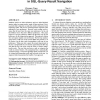Free Online Productivity Tools
i2Speak
i2Symbol
i2OCR
iTex2Img
iWeb2Print
iWeb2Shot
i2Type
iPdf2Split
iPdf2Merge
i2Bopomofo
i2Arabic
i2Style
i2Image
i2PDF
iLatex2Rtf
Sci2ools
188
click to vote
SIGMOD
2007
ACM
2007
ACM
Addressing diverse user preferences in SQL-query-result navigation
Database queries are often exploratory and users often find their queries return too many answers, many of them irrelevant. Existing work either categorizes or ranks the results to help users locate interesting results. The success of both approaches depends on the utilization of user preferences. However, most existing work assumes that all users have the same user preferences, but in real life different users often have different preferences. This paper proposes a two-step solution to address the diversity issue of user preferences for the categorization approach. The proposed solution does not require explicit user involvement. The first step analyzes query history of all users in the system offline and generates a set of clusters over the data, each corresponding to one type of user preferences. When user asks a query, the second step presents to the user a navigational tree over clusters generated in the first step such that the user can easily select the subset of clusters match...
Related Content
| Added | 08 Dec 2009 |
| Updated | 08 Dec 2009 |
| Type | Conference |
| Year | 2007 |
| Where | SIGMOD |
| Authors | Zhiyuan Chen, Tao Li |
Comments (0)

